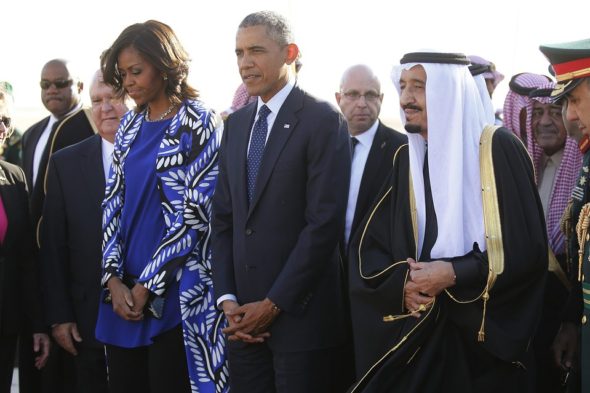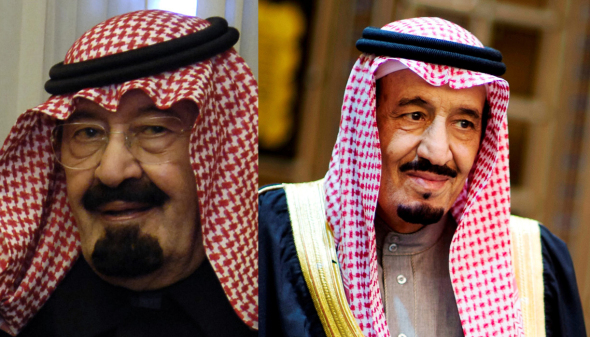redo Jump to...
print Print...

U.S. President Barack Obama and first lady Michelle Obama are greeted by Saudi Arabia’s King Salman as they arrive at King Khalid International Airport in Riyadh, on Tuesday.
(by Colleen McCain Nelson and Ahmed Al Omran, The Wall Street Journal) – President Barack Obama paid a brief visit to Saudi Arabia on Tuesday to offer condolences to the family of the late king and begin building a diplomatic relationship with his successor King Salman.
The two leaders traded views about a series of regional security issues including terrorism, efforts to counter the Islamic State extremist group, the need to aid the Syrian opposition and the civil war in Iraq, a senior U.S. administration official told reporters on Air Force One. They also discussed human rights and oil markets and spoke about the crisis in Yemen and about Iran.
For the president and King Salman, the meeting was a test of what has been a fraying relationship. For Saudi Arabia, it was a chance to demonstrate that relations with the U.S. are still strong, raising the question of whether the death of the monarch might pull the two countries closer.
Relations between Washington and Riyadh have been tense in recent years. While most of the strain stemmed from differences over how to handle crises in the region, some of it was seen as President Obama’s inability to strike a close personal friendship with the late king.
The president spent only four hours in the Saudi capital of Riyadh. He met King Salman over dinner at the Erga Palace and for more than an hour after their dinner.
The U.S. official described the discussion as a “framework for how they’re looking at the key issues that the United States and Saudi Arabia are dealing with in the region, and hitting some of the wavetops of those issues.”
On Iran, Mr. Obama expressed his interest in ongoing diplomatic efforts to resolve an international dispute over Iran’s nuclear program. The king didn’t comment on the talks, the official said. …
“I think the general takeaway is that we continue to have a lot of common interests with Saudi Arabia but we’re going to continue to have to stay in very close touch on these different pressing issues,” the official said.

The president was joined in Riyadh by a sizable delegation that included Secretary of State John Kerry , several lawmakers, White House officials and former senior U.S. officials.
The president’s presence and the high-level delegation accompanying him underscored the priority the U.S. places on this relationship. The delegation included a who’s who of present and past administrations, including former secretaries of state and national-security advisers.
James Baker, secretary of state under President George H.W. Bush and part of the U.S. delegation in Riyadh, said it was important to show the Saudis that they are valued by the U.S.
“This is an extraordinarily critical and sensitive time in the Middle East when everything seems to be falling apart, and the kingdom in some way is becoming an island of stability,” he said. “Do we have some problems with them? You bet we do. But we will be in a hell of a lot better shape to handle those problems if the relationship is as strong again as it was when I was in office.”
Regional challenges are forcing the U.S. and Saudis to work more closely together to battle the militant group Islamic State to the north of the kingdom and cope with Yemen’s crisis to its south.
On the flight to Riyadh, Mr. Obama’s deputy national-security adviser, Ben Rhodes, said the White House assembled a delegation “that represented people who had been invested in the Saudi relationship for a long time and who had known King Abdullah well.”
President Obama cut short a trip to India to fly to Riyadh, scrapping plans to visit the Taj Mahal in favor of making a brief stop in Saudi Arabia to pay his respects to the family of King Abdullahbin Abdulaziz al Saud, who died last week. After the monarch’s death, his half-brother, Crown Prince Salman, was declared king.

King Abdullahbin Abdulaziz al Saud, January 2007 (left), Crown Prince Salman, December 2013 (right)
Vice President Joe Biden had planned to lead the delegation to Saudi Arabia, but the White House scrambled to adjust the president’s schedule to allow him to go.
Mr. Rhodes said it was the president’s choice to make the trip, adding that the visit would serve to mark the transition in leadership and to pay respects to the family and the people of Saudi Arabia.
In an interview with CNN on Tuesday, the president said he would continue to make the argument to allies that if they want a sustainable society, “then they’re going to have to change how they do business.”
“What I’ve found effective is to apply steady, consistent pressure, even as we are getting business done that needs to get done,” Mr. Obama said. “And often times, that makes some of our allies uncomfortable…. Sometimes we have to balance our need to speak to them about human-rights issues with immediate concerns that we have in terms of countering terrorism or dealing with regional stability.”
President Obama and first lady Michelle Obama arrived at the palace late afternoon Tuesday. Some Twitter users in Saudi Arabia expressed anger because the first lady wasn’t wearing a head scarf in the conservative Muslim country, as she did on a recent trip to Indonesia, while others lauded her decision.
Mr. Obama and King Salman spent a few minutes greeting each country’s delegation, sitting together in gold chairs before the start of their closed-door dinner.
Mr. Obama and King Salman have met on a few occasions in the past, but White House officials have said the two leaders still are getting to know each other. King Salman, when he was crown prince, was the one to receive Mr. Obama after his helicopter landed in Rawdat Khuraim resort during his last visit to Saudi Arabia in March 2014.
The new Saudi monarch has indicated the kingdom’s policy will remain largely unchanged, but Mr. Rhodes said given the importance of the issues that the two countries must collaborate on, it is important for Mr. Obama to establish a close relationship with King Salman.
Copyright 2015 Dow Jones & Company, Inc. All Rights Reserved. Reprinted here for educational purposes only. May not be reproduced on other websites without permission from The Wall Street Journal. Visit the website at wsj .com.
Questions
NOTE to students: Before answering the questions, read the “Background” below.
1. a) For what reason did President Obama cut short his trip to India to travel to Saudi Arabia? Be specific.
b) What did President Obama and King Salman discuss during their meeting?
2. What was surprising/unusual about the President’s change in plans?
3. a) Who accompanied President Obama on this unplanned trip? Be specific.
b) Ask a parent or grandparent: what do you think of the large delegation of Democratic and Republican current and former government officials President Obama brought with him to Saudi Arabia?
4. How do reporters for the Wall Street Journal and NY Times explain the President’s decision to go to Saudi Arabia and the number of officials he brought with him?
5. List the reasons relations between the U.S. and Saudi Arabia have become tense in recent years.
Background
The New York Times reported on President Obama’s surprise trip and the unusual delegation of U.S. officials who accompanied him in a Jan. 27 article “Top Officials Join Obama in Brief Visit to Saudi King”:
The fact that [President Obama cut short his trip to India to go to Saudi Arabia to offer his condolences for the death of King Abdullah] was significant, because he rarely travels overseas to mark the death of a foreign leader; more often, he dispatches the vice president, secretary of state or other dignitaries to represent the United States.
American relations with Saudi Arabia were strained by Mr. Obama’s decision not to mount military strikes in Syria against the government of President Bashar al-Assad over the use of chemical weapons. Saudi Arabia has been a bitter foe of Mr. Assad, who has repressed the Sunni Muslim majority in Syria and who has the backing of Iran, the Saudis’ regional rival.
The Saudis are also uneasy about the Obama administration’s pursuit of a nuclear deal with Iran, fearing that it will do too little to restrain the Iranians from developing nuclear weapons.
And they were unhappy with American policy toward the Arab Spring uprisings, especially in Egypt, where they accused the United States of turning its back on a friend, President Hosni Mubarak.
Still, the Obama administration has worked assiduously to try to repair relations with the Saudis. After a pivotal June meeting in Jidda between Secretary of State John Kerry and King Abdullah, Saudi Arabia agreed to join the U.S. in carrying out airstrikes against Islamic State fighters in Syria and Iraq.
Joining the president for the visit on Tuesday were his Republican opponent from 2008, Senator John McCain of Arizona, and several veterans of Republican administrations, including two former secretaries of state, James Baker and Condoleezza Rice.
Ms. Rice was also one of four former national security advisers in the delegation, which also included Brent Scowcroft, Stephen J. Hadley and Samuel Berger.
Senior figures from the Obama administration who joined the delegation included Mr. Kerry; Susan Rice, the current national security adviser and former ambassador to the United Nations; John O. Brennan, the director of the CIA.; and Gen. Lloyd Austin, who oversees Middle East operations. Democratic members of Congress also took part, including Senator Mark Warner of Virginia and Representatives Nancy Pelosi and Ami Bera of California and Eliot L. Engel and Joseph Crowley of New York.
The size of the American delegation caught the attention of many in the region. “It is very obvious that Obama wants to make a point, that ‘We do care for Saudi Arabia, and I have assembled your friends and my foes and brought them with me,’ ” said Jamal Khashoggi, a prominent Saudi journalist and commentator. “It is good, but will it be more than just paying condolences?”
Several of the former officials in the delegation said strengthening ties with the Saudis had become more important as the region grew increasingly unstable.
Ms. Rice noted that, “It is a difficult time for the region” and said, “I am here to support the relationship with the Saudis.” She greeted the new king warmly with a broad smile and a…handshake.
Mr. McCain, who is chairman of the Senate Armed Services Committee, said the expansion of Iranian influence in Syria, Iraq, Lebanon and Yemen had highlighted the importance of improving ties. “Saudi Arabia is emerging as the major bulwark against Iranian expansion,” he said. (from nytimes)
Daily “Answers” emails are provided for Daily News Articles, Tuesday’s World Events and Friday’s News Quiz.



